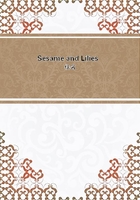
第39章
One pleasure past, another still we gain, And not a vanity is given in vain."But the effect of failure upon my own mind has been just the reverse of this. The more that my life disappointed me, the more solemn and wonderful it became to me. It seemed, contrarily to Pope's saying, that the vanity of it WAS indeed given in vain; but that there was something behind the veil of it, which was not vanity. It became to me not a painted cloud, but a terrible and impenetrable one: not a mirage, which vanished as I drew near, but a pillar of darkness, to which I was forbidden to draw near. For I saw that both my own failure, and such success in petty things as in its poor triumph seemed to me worse than failure, came from the want of sufficiently earnest effort to understand the whole law and meaning of existence, and to bring it to noble and due end; as, on the other hand, I saw more and more clearly that all enduring success in the arts, or in any other occupation, had come from the ruling of lower purposes, not by a conviction of their nothingness, but by a solemn faith in the advancing power of human nature, or in the promise, however dimly apprehended, that the mortal part of it would one day be swallowed up in immortality; and that, indeed, the arts themselves never had reached any vital strength or honour, but in the effort to proclaim this immortality, and in the service either of great and just religion, or of some unselfish patriotism, and law of such national life as must be the foundation of religion.
Nothing that I have ever said is more true or necessary--nothing has been more misunderstood or misapplied--than my strong assertion that the arts can never be right themselves, unless their motive is right. It is misunderstood this way: weak painters, who have never learned their business, and cannot lay a true line, continually come to me, crying out--"Look at this picture of mine; it MUST be good, Ihad such a lovely motive. I have put my whole heart into it, and taken years to think over its treatment." Well, the only answer for these people is--if one had the cruelty to make it--"Sir, you cannot think over ANYthing in any number of years,--you haven't the head to do it; and though you had fine motives, strong enough to make you burn yourself in a slow fire, if only first you could paint a picture, you can't paint one, nor half an inch of one; you haven't the hand to do it."But, far more decisively we have to say to the men who DO know their business, or may know it if they choose--"Sir, you have this gift, and a mighty one; see that you serve your nation faithfully with it.
It is a greater trust than ships and armies: you might cast THEMaway, if you were their captain, with less treason to your people than in casting your own glorious power away, and serving the devil with it instead of men. Ships and armies you may replace if they are lost, but a great intellect, once abused, is a curse to the earth for ever."This, then, I meant by saying that the arts must have noble motive.
This also I said respecting them, that they never had prospered, nor could prosper, but when they had such true purpose, and were devoted to the proclamation of divine truth or law. And yet I saw also that they had always failed in this proclamation--that poetry, and sculpture, and painting, though only great when they strove to teach us something about the gods, never had taught us anything trustworthy about the gods, but had always betrayed their trust in the crisis of it, and, with their powers at the full reach, became ministers to pride and to lust. And I felt also, with increasing amazement, the unconquerable apathy in ourselves and hearers, no less than in these the teachers; and that while the wisdom and rightness of every act and art of life could only be consistent with a right understanding of the ends of life, we were all plunged as in a languid dream--our hearts fat, and our eyes heavy, and our ears closed, lest the inspiration of hand or voice should reach us--lest we should see with our eyes, and understand with our hearts, and be healed.
This intense apathy in all of us is the first great mystery of life;it stands in the way of every perception, every virtue. There is no making ourselves feel enough astonishment at it. That the occupations or pastimes of life should have no motive, is understandable; but--That life itself should have no motive--that we neither care to find out what it may lead to, nor to guard against its being for ever taken away from us--here is a mystery indeed.